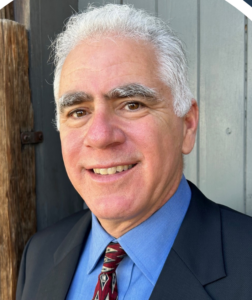
An individual Brightpave marker, middle, flanked by how it looks in action. The red signifies a lane departure, left, and the white and yellow lights illuminate regular pavement markings. (Photos courtesy Brightpave; BusinessDen illustration)
Nearly half of all traffic fatalities happen at night, despite just 25 percent of drive time happening then.
Peter Shaw and his company, Brightpave Markers, want to change that.
“Roadway fatalities in America are a crisis,” said Shaw, 58. “Look at the around 40,000 people per year that die on our roads. Gun deaths are at 48,000 — it’s approaching that kind of a number.”
Brightpave’s product uses solar-powered LEDs to illuminate the roadway at night, a more visible option than the reflectors that currently line highways.
The company also said its product is more durable, with a lifespan of seven to 10 years compared to six months to three years for reflectors. That’s because its rectangular beacons also sit three millimeters under the pavement, whereas above-ground reflectors are susceptible to becoming projectiles when snow plows are out.
“They do a pretty good job as long as you can keep it in the road,” he said of the current options.

Peter Shaw
Brightpave, which Shaw founded this past August, isn’t the first to be pitching its product. The original version was made by Westminster-based Lightspeed Road Solar over a decade ago.
In 2014, the Colorado Department of Transportation installed those devices along a four-mile, eastbound stretch of Interstate 70 near Idaho Springs. Though CDOT didn’t release hard data on the results, Shaw said the agency tracked a 50 percent drop in crashes and a 35 percent decline in property damage over a two-year period.
But Shaw said the products were riddled with mistakes, including water-intrusion issues and long installation times, and it never took off commercially.
Shaw bought the IP from the Lightspeed Road Solar’s contract engineering team this past summer and has been working out the kinks since. His background is in real estate and investment management, and he saw Brightpave as the best of both worlds.
“I’ve always had some of my business activities in early-stage finance,” he said. “And this opportunity is really the confluence of that piece and the development piece.”
Since Shaw took over, Brightpave has raised $700,000 from friends, family and angel investors, including $250,000 of his own money. He said that is part of a larger $1.3 million raise that he expects to close this month.
“You’d call this a pre-seed round, and we’ll soon be moving into a seed round,” he said, noting that the company will raise an institutional round starting sometime this quarter. “We’re still anticipating commercialization and working on grant proposals, and also talking with roadway operators to get deals going.”
Shaw expects to start tests later this year, which will run for a two-year cycle. He said that while toll roads often buy the product outright, DOTs require Brightpave to install on its own dime. CDOT has already expressed interest in more studies, and Shaw also said he’s in talks with private roads in Texas and Massachusetts.
Each marker costs around $300, including both the product and install. Grants will fund about half of the tests, and the other half will be company-funded, he said.
That cost and waiting period is something Shaw said will be challenging in the short term. But after the markers continue to produce effective results, he expects revenues to balloon.
“Who wants to wait three years before you start selling something?” he said. “But those numbers will get pretty big pretty quickly.”
Another reason is the limited overhead Brightpave carries. They are a fully remote operation with just three full-time employees: Shaw, a chief operating officer and a chief financial officer. Engineering and manufacturing are both outsourced, he said.
“We should be self-sustaining by 2026. It’ll be a very rapid J-curve profile with rapidly accelerated revenues,” he said, explaining a J-shaped trendline that shows an initial loss followed by significant growth. “Ideally, we grow this to a certain level and sell this to a bigger competitor.”

